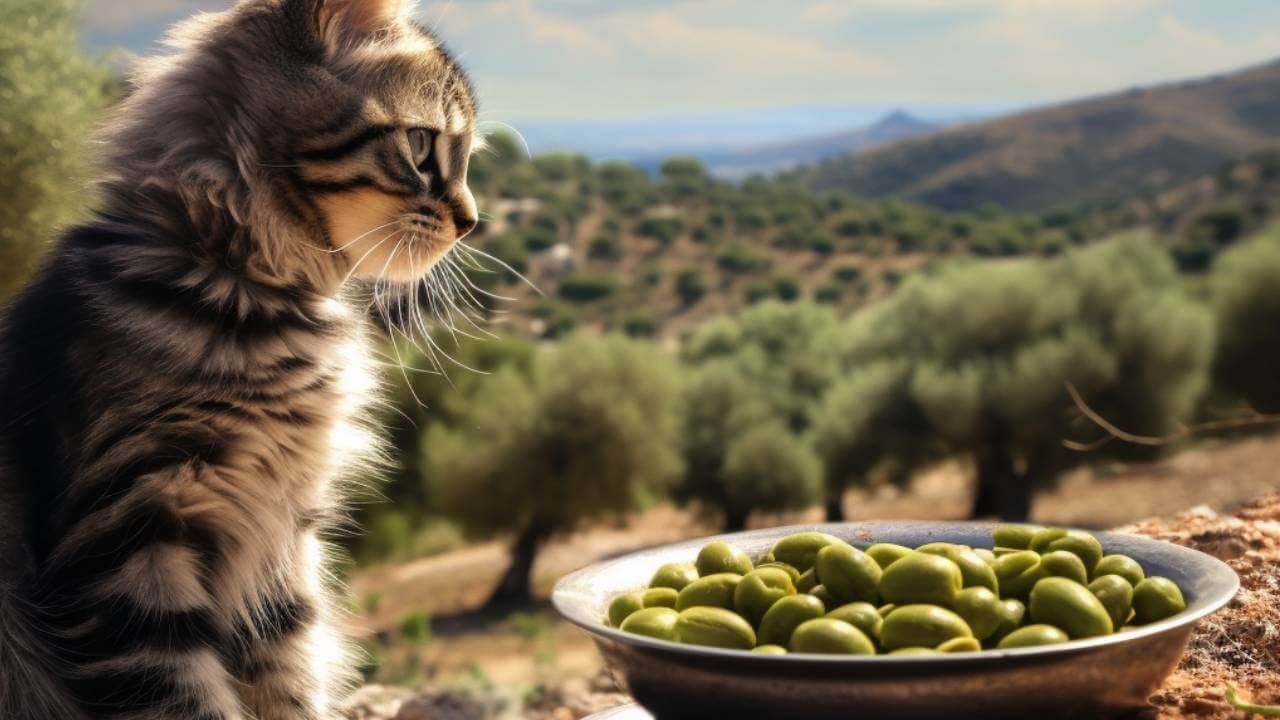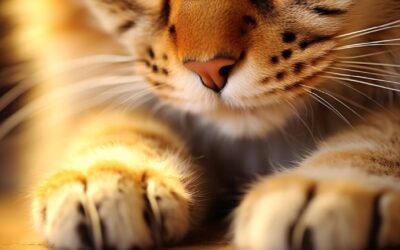If you are a cat owner, you may have noticed your feline friend showing interest in the most unexpected foods, including olives. But can cats eat olives, and should they?
Cats and olives have an intriguing relationship; let’s explore why some cats are drawn to them, whether they are safe for cats to consume, and if there are better alternatives for treating furry companions.
Can Cats Have Olives?
Cats can technically eat olives, but it’s not recommended to include them in their diet for several reasons:
- High Sodium Content: Olives are packed with sodium, which can harm cats in excess. High sodium intake can lead to health issues like high blood pressure and cat kidney problems. Since olives are salty, even a tiny amount can contribute to your cat’s daily sodium intake.
- Lack of Nutritional Value: Olives offer cats no significant nutritional benefits. Cats are obligate carnivores, meaning their primary source of nutrition should be meat. Olives are plant-based and don’t provide the essential nutrients that meat does.
- Digestive Upset: While not toxic, the high-fat content in olives can lead to digestive upset in some cats. This might result in diarrhea or stomach discomfort.
Why Do Cats Like Olives?
Picture this: You’re enjoying a bowl of olives on the couch, and suddenly, your cat leaps onto your lap, batting at the briny delights. It’s a common scenario for many cat owners, leaving them wondering why their feline companions are so captivated by olives.
One theory suggests that the smell of olives is what lures cats. Cats have a highly developed sense of smell, and the intense aroma of olives may pique their curiosity. Also, olives are stuffed with various fillings like garlic, cheese, or peppers, making them even more appealing to a curious kitty.
Another possibility is the texture of olives. Cats have sensitive paws, and an olive’s squishy, slightly rubbery feel might be intriguing.
Cats often use their paws to explore objects, so batting at an olive could be a way for them to investigate this unusual item.

Can Cats Have Olive Oil?
Olive oil is a common cooking ingredient derived from olives, and some cat owners wonder if it’s a safe addition to their feline’s diet. In moderation, olive oil is generally considered safe for cats. It can provide some health benefits, such as aiding digestion and promoting a shiny coat.
Occasionally, adding a drop or two to your cat’s food should be sufficient. Too much olive oil can lead to digestive upset or weight gain, which is not ideal for your feline friend.
Safety Concerns About Olives
Olives are not toxic to cats but aren’t a nutritious addition to their diet. Olives are high in sodium, which can harm cats in large quantities. Excessive sodium intake can lead to conditions like high blood pressure and kidney problems in cats.
The pit or seed inside an olive poses a choking hazard to cats. Cats may attempt to play with or chew on the olive, and accidentally swallowing the pit could lead to serious health issues.
Green Olives vs. Black Olives
Given the potential risks, avoiding making olives a regular treat for your cat is best. If you’re eager to treat your feline friend, consider safer alternatives. Store-bought catnip is an obvious choice, giving them the same euphoric sensation without the potential hazards of brine or pits.
Many cat treats are also available in pet stores, formulated explicitly for feline dietary needs. These can provide both the nutrition and the pleasure your cat craves. If you’re keen on sticking to natural treats, small amounts of plain cooked chicken, turkey, or even fish can be a delightful treat for your pet.

Better Alternatives to Black & Green Olives
Considering the potential risks associated with feeding olives to your cat, it’s generally best to avoid giving them this unusual treat. However, if you want to offer your cat something special that won’t jeopardize their health, there are better alternatives.
- Cat-Specific Treats: Invest in high-quality cat treats for feline dietary needs. These treats are safe and provide essential nutrients that can benefit your cat.
- Cooked Meat: Cats are obligate carnivores, meaning their primary nutrition source should be meat. Small pieces of cooked chicken, turkey, or fish (without any seasoning) can be a healthier and more enjoyable treat for your cat.
- Commercial Catnip: Many cats go wild for catnip, which is safe and enjoyable for them. You can find catnip toys and sprays to provide your feline friend with hours of entertainment.
- Fresh Cat Grass: Cats often enjoy nibbling on fresh cat grass, which satisfies their need to chew and aids in digestion.
- Homemade Cat Treats: If you enjoy baking, consider making homemade cat treats using cat-safe ingredients like tuna, chicken, or catnip.
To olive or not to olive? For our feline buddies, it’s probably best to err on caution. While a rogue olive rolling on the floor might become an impromptu plaything, and a tiny nibble might not spell immediate disaster, keeping our pet’s safety in mind is always best.
Remember, with so many alternative treats available, there’s no need to share your olives. After all, more for you, right?

FAQs
Are olives harmful to cats?
Olives are not toxic to cats but should be avoided due to their high sodium content and choking hazard from pits.
Do all cats show an interest in olives?
No, not all cats will be drawn to olives. Like catnip, some cats may be indifferent, while others might be more curious or enticed by them.
How can I tell if my cat has consumed too much salt from olives?
Symptoms of salt poisoning in cats include vomiting, diarrhea, excessive thirst, lethargy, and tremors. If you suspect salt poisoning, contact a veterinarian immediately.
Can I give my cat unsalted olives?
While unsalted olives don’t pose the same risks as brined ones, they still have pits that can be choking hazards. It’s best to offer safer alternatives.
Can cats eat olive oil safely?
Yes, in moderation. A drop or two of olive oil can help digestion and coat health, but excessive amounts should be avoided.
If I use olive oil in cooking, can it harm my cat?
It should be safe as long as olive oil is used in moderation and your cat isn’t consuming large quantities of food cooked in it. However, always be cautious about other potentially harmful ingredients in the dish.






🤔
Have you ever caught your kitty sneaking a taste of something unexpected? 🐱